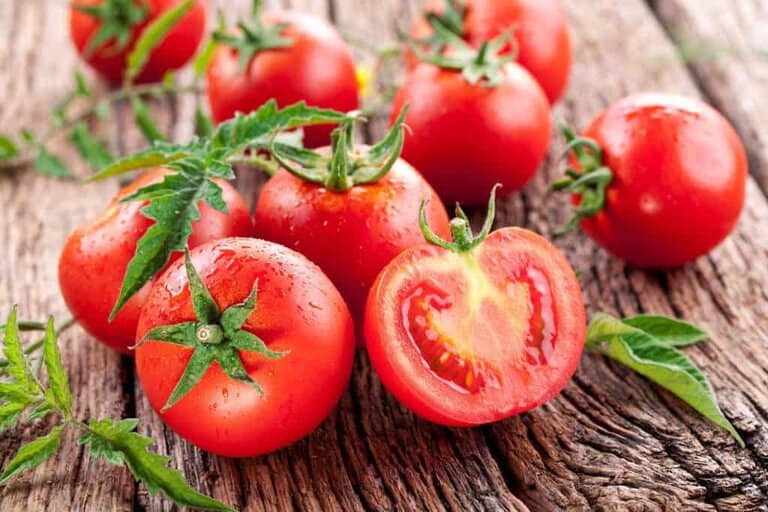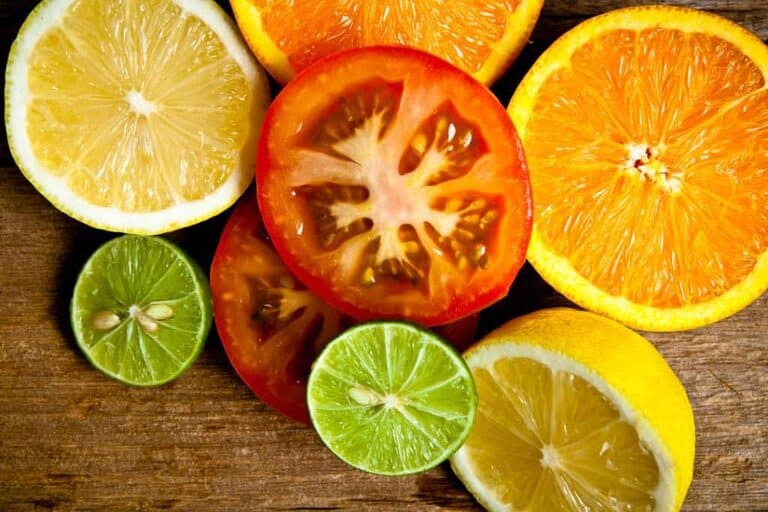Even though tomatoes are botanically classified as berries and share specific citrus characteristics, they are not citrus fruits. Instead, tomatoes are nightshades that belong to the Solanaceae family, just like peppers and eggplants, while citrus plants are members of the Rutaceae family.
Aside from their nutritional value and health benefits, tomatoes are a delicious addition to any diet. And they can be used in various ways as fresh fruit, canned, sauce, or paste. As a result, they are arguably one of the world’s most important crops but is tomato a citrus fruit?
However, Tomato is one fruit whose identity has been questioned throughout history. In Western culture, it is often considered a vegetable, while in many cultures, tomato is regarded as a fruit or even a vegetable/fruit hybrid.
But why should I care? First, as an avid chef and nutritionist, I should be aware of the various types of food I prepare, their nutrients, and how to combine them to form a complete diet.
If you’re also curious to finally put an end to the confusion of whether a tomato is a citrus fruit. This article will explain all you need to know about tomatoes.

What Type Of Fruit Is A Tomato?
Wait! Perhaps the first question should be, what kind of food is a tomato? It is essential to resolve the age-old debate over whether tomatoes are even fruits in the first place or vegetables.
The Supreme Court also cared about what class of food a tomato is when it decided in 1893 that “tomatoes should be classified as vegetables, not fruit.” The court’s decision was included in the 1883 Tariff Act, which levied tariffs on imported vegetables but excluded fruits.
Even though we didn’t all totally buy into the court’s decision. The reasoning behind it seemed reasonable at the time. You’ll find out soon enough.
The basic idea behind the ruling was that since tomatoes are used in recipes alongside other vegetables, why should they be treated differently? So perhaps it’s fair to call that legal classification of tomatoes.
Well, not just yet. Technically, tomatoes have been classified in two ways: botanical and culinary.
Botanical Classification Of Tomatoes
The botanical classification is based on a plant’s structure and function. According to this classification, tomatoes are fruits. Like other fruits, they grow from the flowers of a plant and contain seeds.
Culinary Classification Of Tomatoes
The other classification of tomatoes is based on their culinary use. Tomatoes are commonly used in cooking alongside other vegetables to create delectable dishes. As a result, they are simply classified as vegetables. This was the vantage point from which the Supreme Court viewed tomatoes in 1893.
Okay, now the confusion has been resolved; tomatoes are both fruits and vegetables. And I see nothing wrong with belonging to two classes.
But what kind of fruits are tomatoes?
Tomatoes are botanically classified as berries like eggplants, cucumbers, avocados, grapes, and watermelons. Berries have common characteristics such as
- Bright colors.
- Fleshy pulp.
- Multiple seeds grow from a single flower with one ovary.
On the other hand, citrus fruits are also botanically classified as berries. But they do not belong to the same plant family as tomatoes. Tomatoes are members of the nightshade plant family.
Perhaps a quick distinction between citrus and nightshades will help clear things up.
What is Citrus Fruit?
Citrus fruits are members of the Rutaceae family of flowering plants with juicy and strong flavors. And they are one of the world’s largest fruit crops.
They are divided into segments; a fragrant bright skin layer and a spongy interior with essential oils. Oranges, lemons, limes, and grapefruits are some examples of citrus fruits.

Citrus fruits have the following distinctive characteristics:
- Strong fragrance.
- Their rinds are thick, and their interiors are pulpy.
- They have inedible skins that must be peeled away to reveal the pulpy interior.
- Low in calories and are ideal for people who want to lose weight.
- They are primarily processed for juice.
What is Nightshade?
The name Nightshade is associated with several toxic and poisonous plants. However, there are also edible nightshades that are essential food crops.
Most nightshades are herbs, but some are shrubs, vines, or trees. Nightshade plants include tomatoes, eggplant, potatoes, peppers, and tobacco.
Here are some unique characteristics of nightshades
- They have simple leaves that are often hairy in texture and may have a strong smell.
- Some have fleshy and juicy fruits (such as tomatoes), while others have a dry fruit-like capsule (such as tobacco plant).
- Asides from potatoes, which are tubers, nightshade plants are commonly used as vegetables in cooking.
- These plants contain alkaloids, a nitrogen compound used as drugs.
- They can be high in nutrients such as vitamins, protein, and fiber.
Is Tomato A Citrus Fruit?
Tomatoes are definitely not citrus fruits. Instead, they are members of the nightshade family like the potatoes and eggplants. But tomatoes have some similarities with citrus fruits, which may be why they are often confused with citrus fruits.
Tomatoes and Citruses: Similarities and Differences

Similarities
- The major similarity between these plants is that they are both botanically classified as berries; both grow from a single ovary and have seeds in their flesh.
- Both tomatoes and citrus fruits are high in vitamin C.
Difference
- Tomatoes mature faster than citrus fruits. They grow from seed to fruit in a matter of months, whereas citrus trees take several years to establish themselves.
- The entire tomato is edible, whereas the skins of citrus fruits are inedible.
- Tomatoes have no fragrance in their skin, whereas citrus fruits do.
- Tomatoes, unlike citrus fruit rinds, cannot produce essential oils.
FAQs On Is Tomato A Citrus Fruit
Do Nightshade Vegetables Cause Inflammation?
Many people with arthritis avoid foods such as tomatoes and eggplants in the nightshade family due to the belief that these solanaceous vegetables will exacerbate inflammation. However, this belief is not supported by scientific evidence. And many research says there is no link between inflammation and solanaceous vegetables.
Can I be Allergic To Tomatoes?
Yes, it can be very possible to be allergic to tomatoes and other nightshade vegetables. Some common allergies include coughing, skin rash, and pale skin. You should contact a doctor if you notice any of these signs.